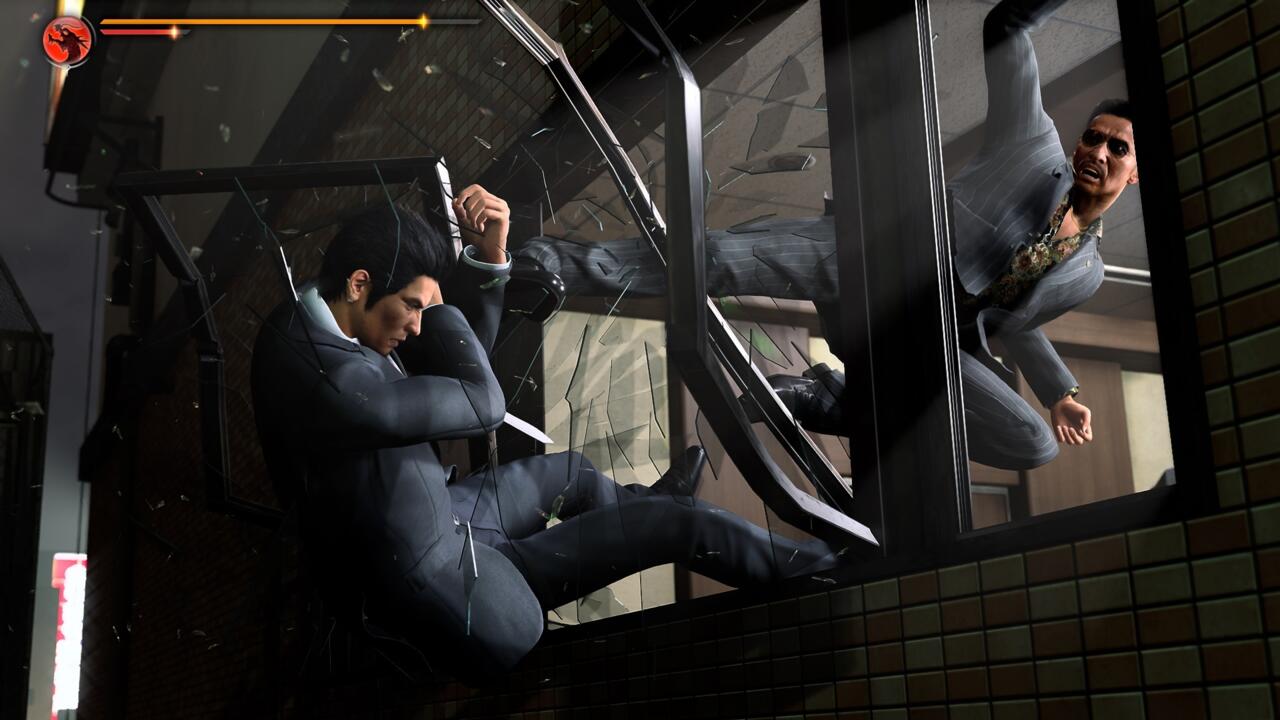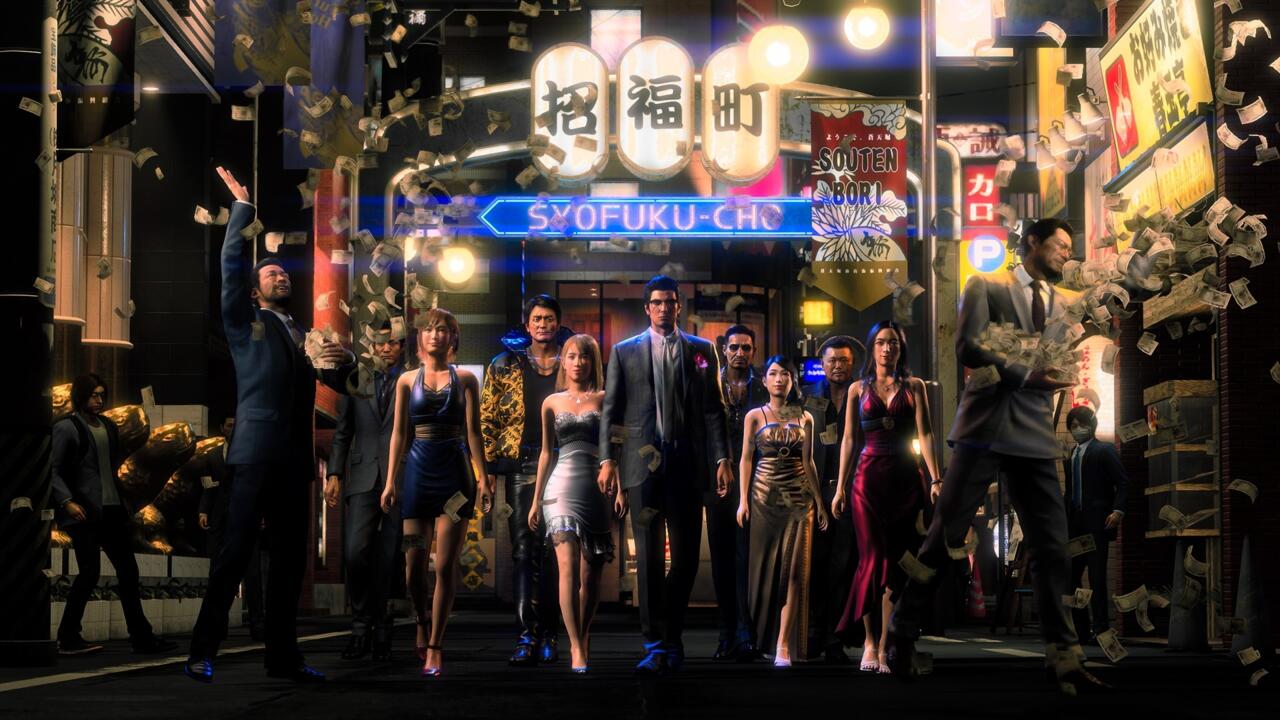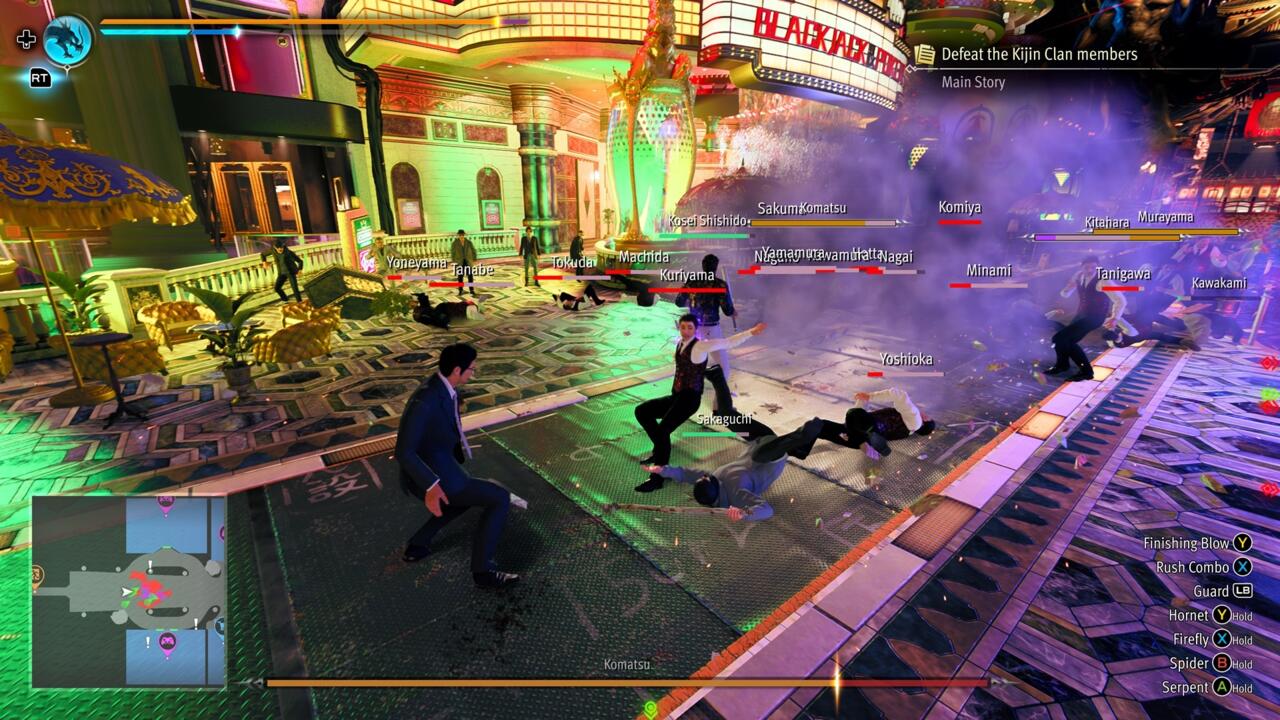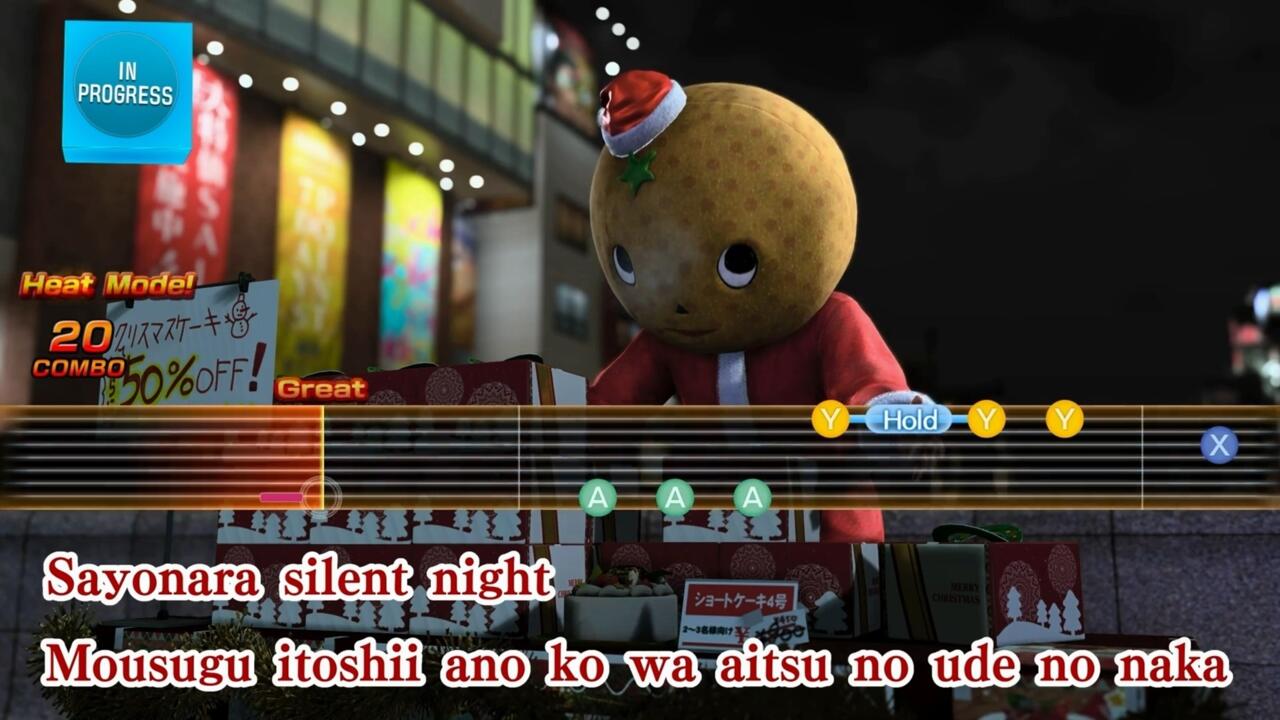Perhaps I was naive to think that the legend of Kazuma Kiryu actually wrapped up with Yakuza 6: The Song of Life, and that his appearance in Yakuza: Like A Dragon was simply a nod to longtime fans such as myself. Having played through Like A Dragon Gaiden: The Man Who Erased His Name, I'm now convinced that leaving Kiryu to grow old in the shadows wouldn't have been the right move. Although Gaiden is a bite-sized story--noticeably shorter than previous entries--it proves that there's still so much more to Kiryu's legacy.
From the wild new Agent fighting style to the wealth of captivating side activities and tried-and-true Yakuza story drama, Gaiden is a tight package that's akin to a 'greatest hits' for the franchise. While it may feel like a retread of previous games at times, the formula is no worse for wear and continues to finds ways to surprise me with its straight-faced delivery of absurdist humor. Gaiden acts as a middle chapter that flows into the events of Yakuza: Like a Dragon, the 2020 RPG starring Kasuga Ichiban as the protagonist, and it leads directly into the upcoming Like A Dragon: Infinite Wealth, which has Ichiban and Kiryu teaming up. It's tough to talk about this game in a vacuum, but because it so heavily targets those who've been on the Yakuza journey all this time, it hit me hard in my feelings--especially as I barreled toward its heart-rending conclusion. In that respect, it is both a typical and exceptional entry in the Yakuzaverse.
With Kiryu as the leading man, the real-time brawler combat returns, but Gaiden doesn't simply rehash the old system. The new Agent fighting style adds enough to freshen up fights by giving Kiryu some James Bond-esque gadgets to complement the melee finesse of this fighting style. As you progress in the main story, you'll gradually unlock abilities like the drones that swarm and chip away at enemies, rocket boosters on his shoes that let Kiryu jet around combat encounters and plow through bad dudes, and explosive cigarettes that act as a grenade to blast away mobs. Kiryu also channels some real Spider-Man energy with the aptly named Spider ability, where he shoots out a wire from his watch to lasso enemies, launch them across the arena, or pull in weapons from afar. And it's oh-so-satisfying to weave it in mid-combo to start juggling enemies as if you're a god-tier Tekken player. He even uses it in web-slinging fashion to swing around in action-packed cutscenes--it's absolute Yakuza nonsense, and I love it.
Additionally, the parry mechanic to avoid unblockable attacks helps mitigate the frustration of having to frantically dodge formidable foes or get utterly demolished. If all else fails, the Extreme Heat mode in Agent style can tear down the strongest enemies swiftly thanks to beefed-up gadgets and unbreakable combos. It contrasts nicely with the traditional Yakuza stance, which plays closer to Kiryu's classic street fighting styles with heavier swings and gruesome Heat moves. So, from a combat perspective, Gaiden offers more tools that are genuinely fun to experiment with and work into your approach in tougher challenges--I rarely felt like I was pitted in a battle of attrition, which was often the case in the series' past. It's not quite as elegant as Lost Judgment, which remains RGG's best iteration of action combat, but Gaiden's mechanics had me looking forward to fighting mobs of 20-plus goons at the same time when the opportunity arose.

Of course, this being an RGG game, over-the-top fisticuffs are only one part of the equation, and the bigger draw for me has always been the storytelling. Having played every entry in the series, it's hard to be surprised by specific plot twists, yet I still found myself on the edge of my seat in the story's crucial moments, as friends turn to enemies and enemies to friends. And I just knew there'd be major betrayals or someone entering a scene at the last second to save the day, but finding out who does it and their reasons for doing so remains as captivating as ever. Part of it is because I've been invested in this world for so long that seeing the developing dynamics between longtime characters and the new supporting cast continues to be fascinating. And in series tradition, the high-tension drama is told through powerful voice performances and masterful cinematics that make the most of these larger-than-life personalities.
Sometimes it's hilarious how the story portrays Kiryu as an undercover agent named Joryu, working for the Daidoji Faction, a shadowy organization that influences Japan from behind the scenes. It is especially amusing as he deliberately does not keep a low profile and gets roped back into the business of the Tojo Clan and Omi Alliance, all while insisting he's not really Kiryu. It's a bit silly but speaks to a larger theme about him being conflicted about his life choices, more so than in previous stories. Gaiden treads through familiar territory where Kiryu tries to escape his old life by disappearing and living off the grid elsewhere in Japan--the premise of Yakuza 5 and the ending of Yakuza 6--but this game is a reminder that we've pretty much experienced every pivotal moment in Kiryu's life thus far, and so long as he's alive, he'll never fade away. He's always been the hardened tough guy who rarely lets anything phase him, even when on the brink of death or when fighting tooth and nail for those he loves. That's a big reason why Gaiden hits so hard, not because we revisit some of those memories along the way, but because those memories are wielded in such a way that they give Kiryu a level of emotional depth that we've never seen before.

If you played Yakuza: Like A Dragon, you know where the story heads since Gaiden is largely about what he was doing in the background, prior to his cameo. But seeing events from Kiryu's perspective adds texture to the bigger picture. This is also the missing piece that explains the reasons behind Kiryu's prominent role in Infinite Wealth, and rather than feeling like a filler chapter, Gaiden highlights the things that make the legendary Kazuma Kiryu human.
The main story is rather short, and it sometimes goes through the motions of a typical Yakuza story and glosses over aspects that could've used a bit more depth. As a result, Gaiden's brevity ends up being a double-edged sword that prevents it from dragging on longer than it needs to and cuts to the chase but leaves a few supporting characters and plot beats slightly underdeveloped. However, you get just enough time with the newcomers to understand them and their motivations, and when the main story hits its peaks, it's the good stuff only RGG can pull off. Gaiden takes about 10 hours to finish, not including any side content. Naturally, though, the side content is one of the core pillars of the series and it delivers, so I wouldn't recommend skipping it in this or any other entry in the franchise.
Gaiden mostly takes place in the familiar location of Sotenbori, and it works fine for what the game is going for. The one new location you get, The Castle, is a lavish Vegas-like hub area built inside of an abandoned naval ship. The neon-soaked strip features casinos for gambling minigames and a luxury clothing store where you can customize Kiryu's outfits, and it's enough of a diversion to stave off the staleness of otherwise walking the same streets again. The Castle is also key to Gaiden's story, as it's used as a stronghold for a powerful yakuza family and a place for some wild set-piece battles. While the main quest funnels you to and from The Castle for story purposes, integrating some of the side activities along the way, the primary draw is the Coliseum, an underground fight club made of dozens of brawling challenges.

It's one of the game's more elaborate pieces of content, featuring one-on-one tournaments, battles against waves of menacing men, and the party-based Hell Team Rumble. Here, you recruit NPCs who are usually goofy-ass dudes who have no business being in a cage match but, somehow, manage to put up a respectable fight. The Coliseum works well because the core combat system is enjoyable, but it also implements management sim elements similar to previous Yakuza minigames, such as the RTS-style Clan Creator from Yakuza 6 or Majima Construction from Kiwami 2. Your team members level up, grow stronger, and you can keep them in fighting shape by interacting with them at the poolside bar that they hang out at once they're recruited. The hardest battles are found in the platinum challenges and truly test your combat skills and party management. There's also a side story where you fight the four leaders of The Coliseum--not only is this a fun time, but the incentives are a nice cherry on top to help you see it all the way through.
Gaiden features a slew of other minigames from the series' past, including the Pocket Circuit, where Kiryu gets really into customizing RC cars to race them in local events, which is adorable. For karaoke, Sayonara Silent Night is a heartbreaking Christmas ballad, Like a Butterfly makes for a great duet, and yes, Baka Mitai is on the setlist. The Cabaret Club returns as a social sim minigame where you make dialogue choices with hostesses as real-life models who rizz you up through FMVs. It's admittedly pretty jarring since the transition to FMV scenes of cabaret hostesses staring into your soul feels out of place, but once I got past that initial bewilderment I found the conversations kind of endearing, even though they're rather basic. It's also worth mentioning the roster of retro games that are fully playable inside of Gaiden, like Sonic the Fighters and Fighting Vipers 2, which are available at arcades. And there's also the original versions of Master System games such as Fantasy Zone 2, Alex Kidd in Miracle World, and Alien Syndrome, too--it's a neat perk and further highlights the series' and Sega's tradition of preserving classic games within its modern ones.

This wouldn't be a proper Yakuza/Like A Dragon game without the series' signature substories, which once again deliver comedic and often poignant side quests that bring the city to life, while giving Kiryu some of his most memorable moments. In Gaiden, substories run through the new character Akame, who operates the Akame Network. She's crucial to the main story as someone who serves as Kiryu's informant and wields her street rep to keep him connected to the underworld, but she's also a charismatic and energetic Osakan who works behind the scenes to defend and uplift Sotenbori's homeless population. Through the Akame Network, you accept requests to help different people in the open world or investigate reports of strange things happening in the streets. And while the 20-plus substories are enjoyable to varying degrees, Gaiden has some notable bangers.
One substory revolves around a young man who's utterly convinced he needs to use an AI chatbot to create perfect responses on dating apps, but lacks the social skills to follow through. It gives a rather nuanced take on the subject and seeing it through the lens of "old man" Kiryu reminds you that he's more thoughtful than he often seems. You'll also encounter a livestreamer who goes to the absolute extreme for attention, which then turns into a spoof on horror story tropes. Others have you thwarting money-laundering schemes, facing off against a series of rival gangs, or chasing down a fully kitted samurai who roams the streets, reminiscent of Mr. Shakedown in Yakuza 0. But the best substory has to be the one where RGG universes collide for a sort of crossover episode where your favorite characters finally interact with each other.
The Akame Network is a cleaner way to package substories, but they also come with more substantial rewards like tons of cash and Akame points, both of which are necessary to upgrade Kiryu's combat abilities. It's a bit of an odd progression system, but it pushes you toward completing these requests, which I had no qualms about since the substories therein are almost as essential as the main story. And the more requests you finish, the better your social standing with Akame becomes. This results in opportunities to hang out with her at the bar and strike up genuinely interesting conversations about her life and motivations, while also showcasing Kiryu's ability to be a great friend.

Once you wrap up the main story, you get access to the Infinite Wealth demo that's included with Gaiden. And while that is a separate game, it's an exciting part of the overall package. It further emphasizes Gaiden's place as a bridge to the next game and, following Gaiden's conclusion, I was left more invested in Kiryu's journey than I've ever been. No other game franchise pours this much into a single character's life, so to have seen where he started and everything he's gone through over the course of eight-plus games, his perspective at this critical narrative juncture for the series feels warranted.
And so there I was, sitting in front of my TV, watching Gaiden's ending, crying like a damn baby over the hardships of a fictional man again--and I know those who've also been on this ride over the years will feel me on this. Gaiden may be a brief excursion that occasionally leaves the full potential of its supporting cast on the table and often relies on remixing ideas from the series' past, but with enough new features to make combat exciting and a buffet of high-quality side content, it's still some of the most fun I've had with an RGG game. More importantly, I was just happy to be in Kiryu's shoes again for another emotional story and to brace myself for what lies ahead for the beloved series.